As America’s once-comfy Left-to-Right consensus couch pops another coil with the intensified abortion fight, it’s worth asking why this supposedly polarizing question isn’t tearing Israel apart. After all, everyone “knows” abortion is a religious issue and Israel is a “religious” country. And everyone “knows” abortion is an all-or-nothing issue and Israel is a famously fractious state.
Hmm. Maybe it’s more about America than about abortion....
Since 1977, abortion has been legal in Israel. Reflecting popular ambivalence, local committees assess each case, but approve 98% of abortions.
Israeli law updates the Jewish approach, justifying abortion when the mother’s life is endangered. Rather than treating abortion as a good-versus-evil issue, Jewish law and Israeli law acknowledge the complexity, seeking some middle path. Such subtlety lowers the emotional temperature. Allowing it without encouraging it, legalizes abortion without romanticizing or demonizing.
The American consensus is also nuanced. Since the 1990s, most Americans agree with Bill and Hillary Clinton that abortion should be safe, legal and rare. Most Americans regret the terminating of a pregnancy which others might bless, but they don’t want the state invading a woman’s privacy by forcing her to have an unwanted baby.

In America, constitutionalizing abortion made it polarizing. Bypassing Congress and state legislatures, the Supreme Court’s Roe v. Wade decision and its opponents made abortion a matter of absolute rights, and absolute right-versus-wrong. Going all-or-nothing, pitting “the baby” against “the mother,” clouds the consensus, empowers extremists and unleashes the political chaos convulsing America.
Israel’s abortion debate has another, constructive, dimension. C.R.I.B.-Efrat – the Committee for the Rescue of Israel’s Babies – discourages abortions by hugging, educating and supporting, Israel-style – not bullying, shaming or outlawing. Since 1977, Efrat has helped over 79,000 once-reluctant mothers decide to give birth. Some put the child up for adoption. Others raised their kids. Most appreciated the counseling, the coaching and, sometimes, the financing – supporting families in those first stressful years.
In America today, Trumpians negate any deviation from traditional norms, while Woke-ians so negate traditional norms traditionalists feel deviant. The Israeli way encourages conformity in general while embracing reforms as necessary. As a family-oriented, traditional, diverse and democratic society, Israel at its best accepts convention without rejecting those who reject it. That’s why gays served in Israel’s army long before they served in America’s. And that’s why most Israelis still venerate the family, even while acknowledging that not all families look alike.
WARNING, WARNING, smug alert!
This past week, even while avoiding abortion blowups: an MK mused about blowing up the Supreme Court; another MK Will-Smithed a cop in the head; Women of the Wall accused the Jewish Agency’s temporary chairman of busing in goons to bring violence to the Kotel; a 65-year-old retired nurse was caught threatening the prime minister’s family; and the eight-party octopus coalition nearly collapsed.
Nevertheless, Israelis remain more unified than Americans. First, our enemies’ curses deliver a collateral blessing. When so many self-righteous outsiders ignore the 19 Israelis intentionally murdered recently, to condemn Israel for “murdering” a journalist who was killed accidentally in a crossfire whose investigation the Palestinian Authority sabotaged, these hypocritical haters unite us.
Second, Zionism – leveraging our shared up-and-down history to build ourselves up – keeps the State of Israel in a state of forever becoming, not just being. Israel remains propelled by its mission to save Jewish bodies and the Jewish soul while improving the world. In Altneuland, old-new-land, we preserve our moral and spiritual heritage as the first of first peoples while bursting boundaries as the world’s dream catchers. Last week, Calcalist’s latest list of Israel’s 50 most promising start-ups showed that from hi-tech to fintech, from cyber to pharma, Israelis keep doing well by doing good.
Finally, Israel remains a small town, with the solidarity, spirit, and shared language of traditional Jewish communities. People living in tight-knit communities have their labels and the freedom to cross wires, too.
You can hear such creative confusion in the soulful, catchy, memorable melodies for Friday night prayer that avowedly “secular” Israeli icon David Broza just introduced on May 6, at New York’s Reform Temple Emanu-el. And some of us witnessed this Jew-nity on May 10, when the Azrieli clan celebrated the 100th anniversary of David Azrieli’s birth.
Rather than build another mall, his daughter Danna commissioned a Torah for the synagogue in Israel’s tallest building, the 61-story Azrieli Sarona Tower. It was a fitting tribute. David looked “secular.” But, eschewing labels, he was a Jew who loved Torah – and studied it – as part of our common heritage.
The celebrations included Danna Azrieli’s gripping recounting of her father’s Zionist Jew-jitsu, from Nazi target to real estate magnate. Offering highlights from her new edition of David’s memoirs, One Step Ahead, Danna summarized his journey, fleeing the Nazis from his Polish town when he was 17 in 1939, through Russia, finally arriving in Palestine with Moshe Dayan’s help.
We then danced the Torah under a huppah around the Sarona complex – during Tel Aviv’s rush hour. The passing Tel Avivians sang, danced, clapped and smiled with us. Their joy proved that not just on our national holidays, not just when we mourn, but, day-to-day, Israelis still use Jewish traditions to express joy and sorrow, to seek morality and meaning.
So, yes, Israelis know how to argue and bicker. We have our blowhards and blowups. But Israelis also appreciate being among the first Jews in centuries to duke it out and dance it out, on the streets, in freedom, in our homeland. That privilege keeps us grounded – and united.
The writer is a distinguished scholar of North American history at McGill University, and the author of nine books on American history and three on Zionism. His book Never Alone: Prison, Politics and My People, coauthored with Natan Sharansky, was published by PublicAffairs of Hachette.
